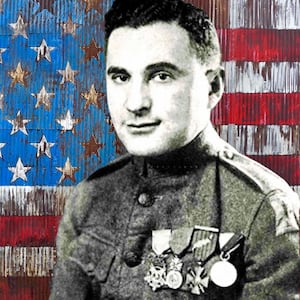Peter Jackson’s vital new World War I documentary They Shall Not Grow Old is basically science fiction. It’s a historical document so viscerally transporting, it’s like time-travel—bridging a hundred years to stand in direct eye contact with English soldiers, captured here in more lifelike detail than in anything outside of fiction.
In full color, we see the way they’d have looked, hear the way they’d have sounded, share their horror at the then-new inventions rolled onto the field to tear bodies apart. But they’re more than distant, tragic figures here. They’re flesh and blood, sharp and recognizably dry-humored in the face of what seemed like the end of the world. (1918 and 2018 have that in common.) What Jackson’s team has done here amounts to re-humanizing men whom time and the limits of technology had flattened into silent, black-and-white slivers of themselves. It’s not until you see it, really, that you realize how significant—and necessary—that is.
Jackson and the New Zealand-based production company Park Road Post Production restored a full 100 hours of archival footage from the Imperial War Museum—much of which had been shot for propaganda newsreels—for the centennial of the Great War, meticulously scrubbing away decades of dirt, dust, scratches, and blemishes. They colorized the footage, matching uniforms to what we know infantrymen of corresponding ranks wore and what the locations they stood in look like today. They sped the frame rate up to a modern 24 fps, smoothing the jerkiness of hand-cranked camera-shot footage and restoring the naturalism of soldiers’ movements and mannerisms.
Finally, the footage was converted to 3-D and paired with blockbuster-worthy sound for a singularly immersive spectacle. (This is still the guy behind the Lord of the Rings and Hobbit trilogies, after all.) A mid-film transition from traditional black-and-white war reels to Jackson’s fully-restored, colorized footage feels like Dorothy waking up in Oz. It’s a hell of a trip.
The film unfolds without a narrator or talking heads; instead, soldiers tell their own stories in their own words, curated from 600 hours of BBC interviews with veterans conducted in the 1960s and ’70s. They stay light on geography and dates, fostering an intimate, gather-round-the-fireplace quality to the firsthand accounts. As Jackson explains in a recorded video message prefacing the film, They Shall Not Grow Old is “by non-historians, for non-historians,” and he aimed to evoke the feeling of being at war above all else. Few films can capture such incommunicable horrors, but Jackson does instill a sense of camaraderie with the men as we follow them from enlistment to basic training to the Western Front, up until the inking of the 1918 Armistice.
The men themselves are a hoot. There’s more laughter than you might expect, as they mordantly recount the indignities and ironies of daily life, from the endless plum and apple jam (“When’s it going to be strawberry?”) to the rule-benders who allowed underage boys to enlist (“I was told to go outside and have a birthday”) to the stench of death on the front lines (“It wasn’t a complicated smell,” one man recalls dryly). Their preferred brands of cigarettes, the green mold that invaded their biscuits, their opinions on the mandatory haircuts that left them looking “more like convicts than soldiers”—all their anecdotes come alive as Jackson pairs them with footage that pops off the screen.
The presence of cameras in the battle camps becomes the film’s eeriest special effect. Soldiers stare curiously into the lens, some amused, some dispassionate, while others have the foresight to actively mug for the camera. (Forensic lip-readers were hired to decode what men mouthed on film; naturally, one yells, “’Ello, mum!”) Few, at least before their first battle, ignore the invention in their midst. They make lingering eye contact, creating a sense they can see us as clearly as we see them. It may not be the time machine H.G. Wells had in mind, but the effect is as uncanny.
The father of science fiction despaired at the beginning of the war at other technologies’ burgeoning roles in the mass slaughter of men, fearing that “man’s increasing power of destruction” would “overwhelm hope, beauty and freedom in the world” if left unchecked. The men’s darkening memories as they reach the milestone of their first assault illustrates why. Jackson fades to black for several long moments as the sounds of trench warfare—machine guns, cannons, voices drowned out by chaos—wash over the screen. When we return, the tenor of their stories has changed.
A man weeps at the memory of having to shoot a fatally wounded comrade. Another recounts with strange detachment “a great number of bullets hitting the right side of my body.” One marvels, 50 years on, that “we’d never heard of flamethrowers” back then. Bodies ripped apart by mines—detonations depicted in terrifying, deafening glory—are described as “fantastic exhibitions of anatomy.” In a particularly graphic memory that needs no accompanying footage, a man recalls the sight of a fallen soldier whose lung had fallen out of his body. He could tell the man still lived from the way his lung slowly rose and fell on the ground.

The anticlimax of the war for the men is almost as wrenching. A soldier remembers the end of the war as the “flattest moment” of his life—no celebrations, just silence. Many more speak of feeling isolated after returning to civilian life, as war had “no conversational value” to those who had not experienced it. One veteran, with a trace of irony in his voice, remembers how certain he felt that war would never escalate to such a catastrophic degree again. Everything should be done to avoid war, several ex-soldiers tell us. “History will show that it was not worth it.”
Jackson’s personal interest in World War I stems from a family connection: his grandfather, Sgt. William Jackson, who served for nine years in the 2nd South Wales Borderers infantry regiment and to whom the film is dedicated. Although that Jackson isn’t depicted in the film, it vividly honors his time in the trenches. They Shall Not Grow Old is minimal-frills moviemaking—it does not moralize or politicize or even leave these soldiers’ side in the mud. It simply lets them speak for themselves, trusting their stories and images to compel us. The result is no less than an indispensable new model for how Hollywood can help keep history alive—and why it should.
They Shall Not Grow Old will play in theaters through Fathom Events on Dec. 17 and 27.







